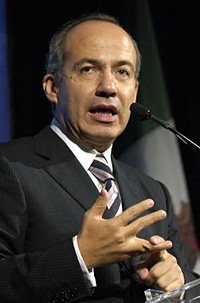 |
 |
 |
 Editorials | August 2007 Editorials | August 2007  
Maneuvering for State of the Union Address
 Allan Wall - PVNN Allan Wall - PVNN


| | President Calderon |
On September 1st, as required by law and custom, the president of Mexico delivers his "Informe Presidencial," the Mexican State of the Union address. Though it hasn't yet been held, this year's informe is already fraught with controversy.

In the old days, when the PRI (Institutional Revolutionary Party) ran a one-party state government, the informe was not complicated. Why would it have been? The same party controlled the executive branch, the legislative branch, and the judicial branch.

In those days, the president of Mexico would use the informe as a propaganda platform to announce policies. In 1982, President Lopez Portillo, who only had 3 months to go as chief executive, utilized the informe to announce the nationalization of Mexico's banking system. The nationalization turned out to be a disaster, but that's another story...

A couple of decades ago, the informe changed from being a ritualized formality to being a bone of contention and a scene of conflict. After the acrimonious election of 1988, opposition politicians began to use the informe as an opportunity to protest. Given the media attention accorded to the annual ritual, that strategy was an effective manner of garnering attention. So from time to time, there were protests at the informe. But no matter what happened, the speech itself continued to be delivered.

That changed last year, when the PRD (Party of the Democratic Revolution,) still smarting over its narrow defeat in the 2006 election, took control of the dais in the legislative chamber to prevent Fox from entering and speaking. So Fox showed up in the lobby, delivered the written text of his speech and left. Technically speaking, this was legally acceptable. Article 69 of the Mexican Constitution, the legal basis for the informe, only requires the president to deliver a "written report." So Fox had discharged his constitutional duty.

The 2007 informe is only days away, and once again, it's a scene of political confrontation.

President Calderon had already agreed to modify the informe's structure, changing it into more of a debate format. More recently, in its recent rather raucous and divisive convention, the PRD promised to prevent Calderon from giving his speech.

At one point in the convention, the PRD voted to continue not to recognize the government of Felipe Calderon (in office for almost 9 months) nor to negotiate with him. The very next day, however, they voted again, and approved a new resolution. They did not vote to recognize the president of Mexico, of course, but they did vote to allow the party's congressmen to negotiate and deal in congress.

The PRD also voted to prevent Felipe Calderon from delivering his state of the union address on September 1st, by taking control of the platform at the front of the legislative chamber and physically preventing President Calderon from ascending it to deliver his discourse.

If this happens, Calderon could do what Fox did last year - arrive to the lobby and deliver the written text of his speech. That would comply with the constitution.

But on August 25th, after a meeting in the city of Morelia, PRD legislators announced that they would not block the president's informe after all, and that they plan to negotiate an accord for the event to run smoothly without humiliating any party involved. That's a promising development.

Another promising development is that PRD legislators are also willing to negotiate the fiscal reform proposal, which is important for Mexico 's economic future.

Certainly, the PAN (National Action Party) and PRI (Institutional Revolutionary Party), with a working majority in Congress, could pass the reform without the PRD's agreement. But it would be much better for the PRD to be on board with its input. It would also make it easier to sell the reform to the public.

It appears that the principal influence within the PRD promoting intransigence is AMLO (Andres Manuel Lopez Obrador) who lost the 2006 election. AMLO is promoting his new book, unsubtly entitled La Mafia Nos Robσ La Presidencia (The Mafia Stole the Presidency from Us). AMLO is stuck in July of 2006, and wants the PRD to be a foot-dragging impediment to anything the Calderon administration proposes.

But hopefully the PRD legislators will leave AMLO behind, and work within the system for the good of Mexico's future.
 Allan Wall is an American citizen who has been teaching English in Mexico since 1991, and writing articles about various aspects of Mexico and Mexican society for the past decade. Some of these articles are about Mexico's political scene, history and culture, tourism, and Mexican emigration as viewed from south of the border, which you can read on his website at AllanWall.net. Allan Wall is an American citizen who has been teaching English in Mexico since 1991, and writing articles about various aspects of Mexico and Mexican society for the past decade. Some of these articles are about Mexico's political scene, history and culture, tourism, and Mexican emigration as viewed from south of the border, which you can read on his website at AllanWall.net.

Click HERE for more articles by Allan Wall. | 
 | |
 |



